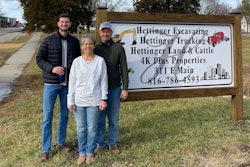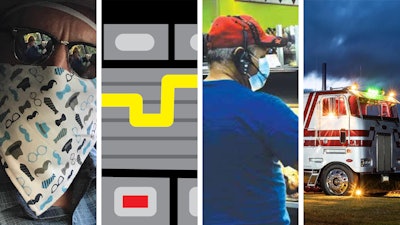
2020 was nothing if not a wild and often confusing ride for most. From the early fears and uncertainty lingering for months after the COVID-19 pandemic first reached U.S. shores in February to the long-lasting impacts on freight and rates and, obviously, the human toll the virus has taken in terms of illness, death and loss — it’s been a trying year for many owner-operators and small fleets.
Below is a collection of the year’s top stories, podcasts, videos and essays published on Overdrive. If you feel like taking a walk back through the year that was — hours of service reforms, how COVID changed drivers’ lives on the road, managing money amid the chaos and turbulence, the stories of truckers weathering what descended, custom truck videos, the serialized Over the Road podcast, truckers’s rights on the road, and much more — peruse the sampling below. Think we missed something? Drop us a line.
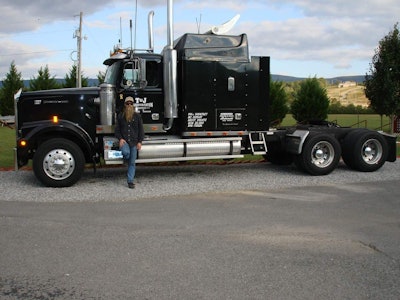 Timothy Barrett owns and operates the one-truck T&J Transportation out of East Tennessee. He was one of many operators who reported shutting down, at least for a few weeks, in the spring in the worst of the year’s freight downturn. Some shut down due to virus risks on the road, and many were forced to sit and wait out cheap rates.
Timothy Barrett owns and operates the one-truck T&J Transportation out of East Tennessee. He was one of many operators who reported shutting down, at least for a few weeks, in the spring in the worst of the year’s freight downturn. Some shut down due to virus risks on the road, and many were forced to sit and wait out cheap rates.Pandemic, closures snared owner-operators.
Many owner-operators and small fleets’ businesses fell on sudden, unanticipated hard times in the early weeks of the pandemic, with many clinging to what few load options were available and holding out hope for federal relief funds amid the worst of the early spring downturn.

Though not all freight sectors rebounded, a few prominent sectors eventually did, helping buoy many through to year’s end.
Overdrive explored the toll the pandemic took on truckers’ businesses first-hand in conversations with dozens of operators throughout the year and via surveys in the first months of the downturn. See a few of those stories here — and a few stories of rebounding business.
Small-business truckers also flocked to the Paycheck Protection Program and other disaster loans offered by federal relief packages from Washington, with many reporting leaning on the relief options to bridge through the downturn. Many truckers also reported, especially in the early months of the pandemic, hanging up the keys to wait out the risks and the poor rates.
Life on the road evolved.
OD Senior Editor Todd Dills throughout the year explored how COVID had affected truckers’ day-to-day. See this series on the acceleration in telehealth options available to drivers, and this one about how truck stops’ food services have shifted. This series from November explored the growing opportunities for shipper-direct freight amid an upended freight market, and the rise of contactless paperwork. Lastly, this story from early April detailed the immediate measures shippers and receivers were taking at the freight docks to ward off virus transmission.
 Read Paul’s collection of essays from 2020, based on his stories from the road during the pandemic.
Read Paul’s collection of essays from 2020, based on his stories from the road during the pandemic.Reefer hauler and regular OD contributor Paul Marhoefer, aka Long Haul Paul, wrote an Overdrive Extra blog series documenting the pandemic’s toll as only Paul could. This one, from early March, reveals the uncertainty and fear that had gripped the air. For example, detailing his interactions with attendants at the scales: “A middle-aged woman places my scale ticket and change on the counter, deftly avoiding the reach of my hand, says thank you, and looks away.” Another, from April, offers a wry take on what it means to be an “essential worker” — one sometimes without a shower.
Others, too, reflect on the strange times in which we found ourselves, such as Paul musing on the loneliness and disappointment in a to-go cup of coffee and the tough decisions truckers and spouses were forced to make in trying to keep each other safe from the virus. Then, just last month, Paul wrote about how the virus had become personal for him, having lost friends to the disease, and applies the logic of the classic Pascal’s Wager to weighing the merits of wearing a face mask.
New hours of service rule sweeps in.
In regulatory news, 2020 saw the ushering in of a new hours of service rule. It initially was met with some apathy and shoulder shrugging by Overdrive readers, many of whom were hoping for a more dramatic re-work. Nonetheless, drivers do have new tools at their disposal, including a way to pause their 14-hour clock. Overdrive over the course of the year explored the new hours regs in-depth and how drivers can work the newly available options. The rule was finalized in May after an 18-month sprint through the regulatory process, taking effect Sept. 29.
ELD makers reported in early November how drivers were using the rule so far, and the early need for some rolling software updates to fine-tune ELD apps to the real-world use cases of the new HOS options.
Tussles in broker relations.
Truckers’ frustrations with brokers, over perceptions that freight brokers were abusing market conditions by hiking their own profit margins at the expense of per-mile rates paid to carriers, boiled over in the spring. To many operators, it smelled strongly of price gouging (or reverse price gouging, as it were), for which there was no legal recourse.
There was a noticeable juxtaposition of truckers being lauded as heroes, including by President Trump in a White House lawn ceremony in April, and the rates many drivers were seeing in the market from brokers — which very much did not reflect that of heroes’ pay.
The primary rallying point became drivers’ push for brokers to adhere to transparency laws that require brokers to disclose what shippers paid the broker, which can be requested after a load’s been hauled.
As driver Al Montano put it in October in discussing the issue, “it’s right there in the law,” that brokers must provide truckers with rates insights if truckers ask for it.
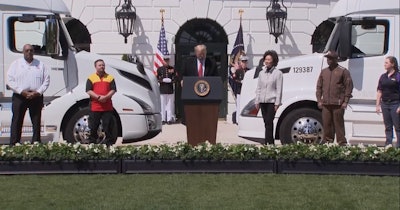 President Trump in April took to the White House lawn to thank truck drivers for working to restock depleted grocery stores and home goods stores, calling truckers “the foot soldiers carrying us to victory” in the fight against the virus.
President Trump in April took to the White House lawn to thank truck drivers for working to restock depleted grocery stores and home goods stores, calling truckers “the foot soldiers carrying us to victory” in the fight against the virus.The ongoing tussle did prompt the Federal Motor Carrier Safety Administration to take a look at the issue of broker transparency. The competing concerns were summed up in this story from October: “Whereas the owner-operators and carriers highlighted the importance of those laws within the existing marketplace, brokers instead expressed seeming concern about the new attention the regs have drawn this year.”
Even before the pandemic and freight downturn drew attention to broker-carrier relations, Overdrive explored in a series in January and February the practices of unscrupulous brokers and the often dire consequences for truckers’ operations when brokers simply skip on freight bills. See that series, and recourses for drivers who’ve been stiffed, here.
Lost and ‘jacked up’ logs.
Continental VDO, which offered the Roadlog standalone ELD device, announced in April it was exiting the ELD business, forcing users of the platform to find a new provider by August. It became the latest provider to abruptly close shop since the ELD mandate took effect in late 2017. Industry onlookers see the closures as part of an inevitable march toward consolidation in a market stacked with hundreds of providers.
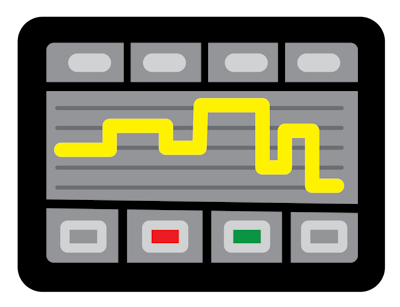 Read this series on consolidation among ELD providers from July.
Read this series on consolidation among ELD providers from July.In other ELD news, check out this podcast from October, in which an ELD provider and an anti-ELD advocate met with representatives from FMCSA to discuss a tie that binds: The need for broadened transparency by freight brokers.
Also, don’t miss this story from January — about how to deal with a “jacked up log” after forgetting to go into personal conveyance mode.
Over the Road‘s in a podcast app near you.
Overdrive teamed up with podcast network Radiotopia to produce an eight-part podcast series telling truckers’ stories from the highway. Hosted by Long Haul Paul Marhoefer, the series is a must-listen — Check it out at overtheroad.fm. Even though much of the subject matter likely will be familiar to any driver in the business, the stories within the series are gripping and moving. Paul’s prowess in connecting with those he’s interviewing offers a glimpse at the humanity behind the big rig. My favorite is Episode 4 — a winding course of interviews with truck stop keepers at three successive stops in Kentucky about which was the first to offer their famous banana (“nanner…”) puddin’.
Regarding the humanity behind the big rig, owner-operator and OD contributor Cliff Petersen wrote throughout the year about the inner demons that drivers wrestle with on the road — and how they can set about conquering them. From his poignant piece dealing with the loss of his wife in June to inspectors (and drivers) being engrossed in negative thought loops, catch Cliff’s collection of essays here.
When you finish the eight-part Over the Road podcast series, check out the weekly Overdrive Radio podcast, which marched through the year telling 2020’s tales of woes, triumphs, reforms and more. Hosted and produced by OD’s Todd Dills, a recap of the year’s top Overdrive Radio episodes is available here:
The show must go on.
Though COVID left a wake of cancelled truck shows behind it, Overdrive recreated the favorites from the annual Great American Trucking Show, including virtual sessions of the Partners in Business program, a virtual Pride & Polish truck beauty competition, the sing-off style finale off the annual Overdrive-Red Eye Radio Trucker Talent Search competition and naming the inaugural Small Fleet Champ:
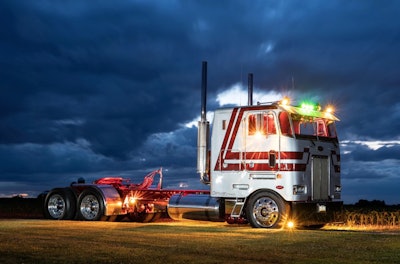 C.J. Donovan’s 1984 Peterbilt 352 won first place in the Antique category during Overdrive’s GATS Week Pride & Polish competition.
C.J. Donovan’s 1984 Peterbilt 352 won first place in the Antique category during Overdrive’s GATS Week Pride & Polish competition.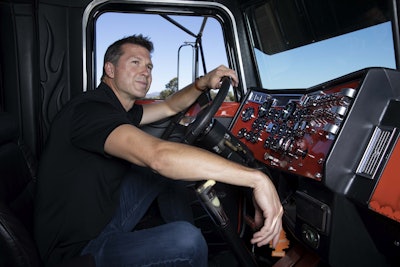 James Davis, founder and owner of the 22-driver fleet JDT Trucking out of Central Point, Oregon. JDT was named the winner of the inaugural Small Fleet Champ award during Overdrive’s GATS Week in August.
James Davis, founder and owner of the 22-driver fleet JDT Trucking out of Central Point, Oregon. JDT was named the winner of the inaugural Small Fleet Champ award during Overdrive’s GATS Week in August. John Malayter won a free recording session by winning the 2020 Trucker Talent Search. A live finale was held in a virtual format during Overdrive‘s GATS Week in August.
John Malayter won a free recording session by winning the 2020 Trucker Talent Search. A live finale was held in a virtual format during Overdrive‘s GATS Week in August.Got business questions? Gary has answers.
Longtime owner-operator Gary Buchs offered a well of invaluable insights into managing a one-truck business in his regular Overdrive Extra columns. A few headlines, for example: “Never hire someone you can’t fire,” from September; “Owner-operators’ No. 1 freight negotiations tool — the right of refusal,” from April; and just recently, “Costs are increasing and your rates need to reflect that,” from December.
We also started a new monthly series this year leaning on Gary’s expertise, appropriately titled Ask Gary. See the first two installments here, in which Gary explains the pros and cons of refinancing your house to pay off your truck loan and how to properly insure your truck so as to not miss out on owed equity if you’re in a crash.
Truckers and trucking $$ favor Trump in the 2020 election.
Consistent Overdrive polling throughout the year signaled that readers heavily favored a Trump re-election in November. Likewise, trucking-based political dollars flowed to Trump and Republican Congressional candidates by margin of about 9 to 1.
Though the election didn’t work out as many readers had hoped, check out this Overdrive Radio installment as to what a Biden presidency could mean for owner-operators and trucking at large. Biden announced this month he was nominating former South Bend, Indiana, Mayor Pete Buttigieg, who also ran for the Democratic nomination for president, as his pick for Secretary of Transportation.
Another change at the top for FMCSA.
Less than a year after Ray Martinez departed his post as FMCSA Administrator, the agency’s interim boss, Jim Mullen, also announced he was leaving FMCSA. Wiley Deck, a longtime high-level FMCSA and DOT employee, stepped in as the interim FMCSA boss until a permanent administrator can be named by the president and confirmed in the Senate.
Custom rigs on the Tube.
None of us got the custom rigs fix we wanted this year, with all the major trucking shows getting postponed or canceled. But this playlist of custom rigs videos on Overdrive’s YouTube Channel can scratch an itch. Give it a watch:
Strapped for cash? Here are some options — and pitfalls to avoid.
Explored in the early days of the pandemic in a series were ways owner-operators and small fleets could grab a lifeline — stimulus or otherwise. It also detailed traps for truckers to avoid — those that can make a bad financial situation worse.
Blacklisted by a fleet? Contracted COVID on the road? Know your rights.
The legal landscape in trucking is complex and seemingly ever-changing. Continued in 2020 was Overdrive’s Trucking Law series — answering common questions and exploring scenarios drivers might find themselves in. Attorneys and legal experts weighed in monthly.
Check-in time at the clearinghouse.
Carriers of all sizes, including owner-operators, were required this year to comply with a new regulation, the CDL Drug & Alcohol Clearinghouse, by creating accounts and performing checks for drivers’ information in the clearinghouse portal. For single-truck owner-operators, that means running a required self-check at least once annually. For small fleets, it means running pre-employment checks for all drivers and once-annual inquiries of current drivers’ CDL numbers. The initial rollout in January was marred with first-time jitters, though FMCSA says software updates have beefed up the system’s ability to handle web traffic.
The system has already sidelined nearly 50,000 drivers for drug or alcohol violations. But as Overdrive reported in February, even under the clearinghouse reg, drivers can still fail a drug test and remain behind the wheel for months.
In November, independent owner-operator Deb Desiderato walked us through the self-check process.
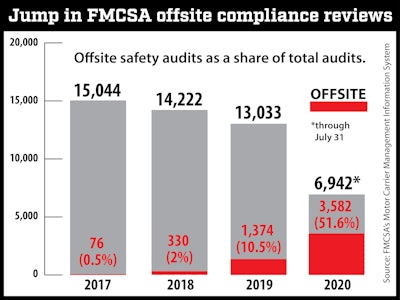 “It was certainly already a trend,” said Daren Hansen, a senior transportation safety consultant for J.J. Keller, of FMCSA’s move toward remote compliance audits. “Now, the pandemic shot those numbers up.”
“It was certainly already a trend,” said Daren Hansen, a senior transportation safety consultant for J.J. Keller, of FMCSA’s move toward remote compliance audits. “Now, the pandemic shot those numbers up.”Small fleets bear the brunt of ramp-up in off-site safety audits.
Another side effect of the pandemic’s forced physical distancing: FMCSA and its state enforcement partners increasingly have turned to remote, off-site safety audits. In September, we documented the dramatic jump in off-site safety audits, FMCSA’s broadened authority to issue safety ratings via off-site audits and what the process looks like for small fleets if they come under scrutiny.
Owner-operators and motor carriers won relief from California’s A.B. law temporarily, and another pivotal court decision looms. California isn’t the only state in the nation that could take up such a restrictive independent contractor classification law. In February, we explored whether the owner-operator model in all of its various forms can survive these legal storms.
‘Twice as good.’
In a year that saw a national focus on race relations, Overdrive editors talked with a few truckers about their perspectives. First up is Todd Dills’ Overdrive Radio conversations with Rico Muhammad, a longtime owner-operator based in Atlanta. Also, see this story from August, based on conversations with owner-operators Sharae Moore and Sharron Lambert.
Goodbye, Bill Mack.
The Midnight Cowboy, Red Eye Radio’s Bill Mack, died in late July of complications from COVID-19. OD Editor Max Heine remembered Mack and how his warmth and late-night chats often soothed lonely truckers on the road — especially in the days before texts and mobile phones. Likewise, readers offered their tributes to Mack.
A new chapter for Overdrive. As Heine wrote this month, Overdrive is entering a new era. The December issue of Overdrive is the last print edition, with 2021 ringing in a new all-digital format for a brand that celebrates its 60th anniversary in 2021, having first gone to press in September 1961.


